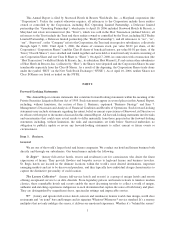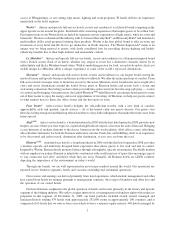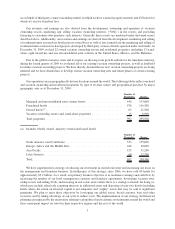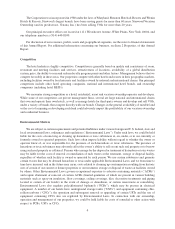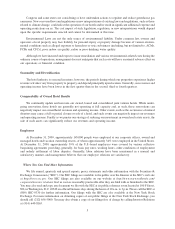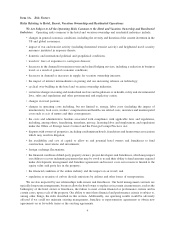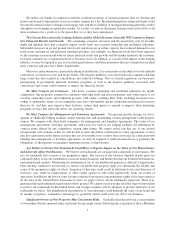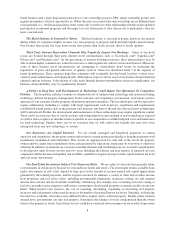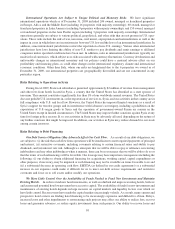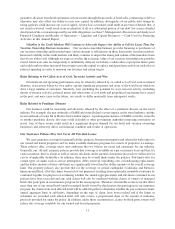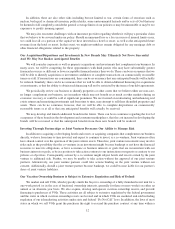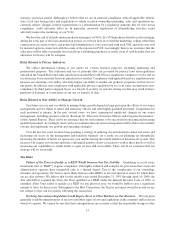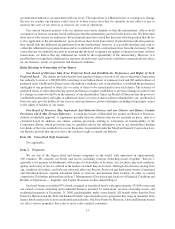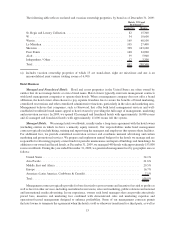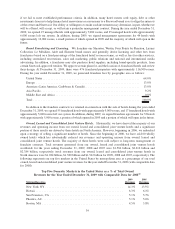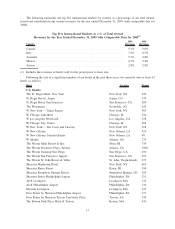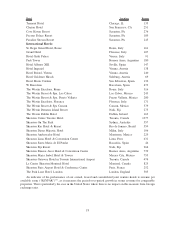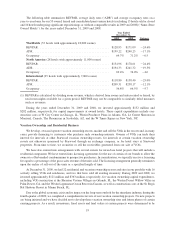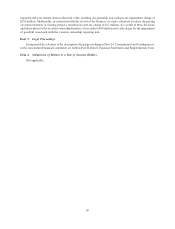Starwood 2009 Annual Report Download - page 86
Download and view the complete annual report
Please find page 86 of the 2009 Starwood annual report below. You can navigate through the pages in the report by either clicking on the pages listed below, or by using the keyword search tool below to find specific information within the annual report.guarantee advances from hotel operations or from owners through the proceeds of hotel sales, refinancing of debt or
otherwise may also affect our ability to raise new capital. In addition, downgrades of our public debt ratings by
rating agencies could increase our cost of capital. A breach of a covenant could result in an event of default, that, if
not cured or waived, could result in an acceleration of all or a substantial portion of our debt. For a more detailed
description of the covenants imposed by our debt obligations, see Item 7, Management’s Discussion and Analysis of
Financial Condition and Results of Operations — Liquidity and Capital Resources — Cash Used for Financing
Activities in this Annual Report.
Volatility in the Credit Markets Will Continue to Adversely Impact Our Ability to Sell the Loans That Our
Vacation Ownership Business Generates. Our vacation ownership business provides financing to purchasers of
our vacation ownership and fractional units, and we attempt to sell interests in those loans in the securities markets.
Increased volatility in the credit markets will likely continue to impact the timing and volume of the timeshare loans
that we are able to sell. Although we expect to realize the economic value of our vacation ownership note portfolio
even if future note sales are temporarily or indefinitely delayed, such delays could reduce or postpone future gains
and could result in either increased borrowings to provide capital to replace anticipated proceeds from such sales or
reduced spending in order to maintain our leverage and return targets.
Risks Relating to So-Called Acts of God, Terrorist Activity and War
Our financial and operating performance may be adversely affected by so-called acts of God, such as natural
disasters, in locations where we own and/or operate significant properties and areas of the world from which we
draw a large number of customers. Similarly, wars (including the potential for war), terrorist activity (including
threats of terrorist activity), political unrest and other forms of civil strife and geopolitical uncertainty have caused
in the past, and may cause in the future, our results to differ materially from anticipated results.
Risks Related to Pandemic Diseases
Our business could be materially and adversely affected by the effect of a pandemic disease on the travel
industry. For example, the past outbreaks of SARS and avian flu had a severe impact on the travel industry, and the
recent outbreak of swine flu in Mexico had a similar impact. A prolonged recurrence of SARS, avian flu, swine flu
or another pandemic disease also may result in health or other government authorities imposing restrictions on
travel. Any of these events could result in a significant drop in demand for our hotel and vacation ownership
businesses and adversely affect our financial condition and results of operations.
Our Insurance Policies May Not Cover All Potential Losses
We carry insurance coverage for general liability, property, business interruption and other risks with respect to
our owned and leased properties and we make available insurance programs for owners of properties we manage.
These policies offer coverage terms and conditions that we believe are usual and customary for our industry.
Generally, our “all-risk” property policies provide that coverage is available on a per occurrence basis and that, for
each occurrence, there is a limit as well as various sub-limits on the amount of insurance proceeds we will receive in
excess of applicable deductibles. In addition, there may be overall limits under the policies. Sub-limits exist for
certain types of claims such as service interruption, debris removal, expediting costs or landscaping replacement,
and the dollar amounts of these sub-limits are significantly lower than the dollar amounts of the overall coverage
limit. Our property policies also provide that for the coverage of critical earthquake (California and Mexico),
hurricane and flood, all of the claims from each of our properties resulting from a particular insurable event must be
combined together for purposes of evaluating whether the annual aggregate limits and sub-limits contained in our
policies have been exceeded and any such claims will also be combined with the claims of owners of managed
hotels that participate in our insurance program for the same purpose. Therefore, if insurable events occur that affect
more than one of our owned hotels and/or managed hotels owned by third parties that participate in our insurance
program, the claims from each affected hotel will be added together to determine whether the per occurrence limit,
annual aggregate limit or sub-limits, depending on the type of claim, have been reached and if the limits or
sub-limits are exceeded each affected hotel will only receive a proportional share of the amount of insurance
proceeds provided for under the policy. In addition, under those circumstances, claims by third party owners will
reduce the coverage available for our owned and leased properties.
11


